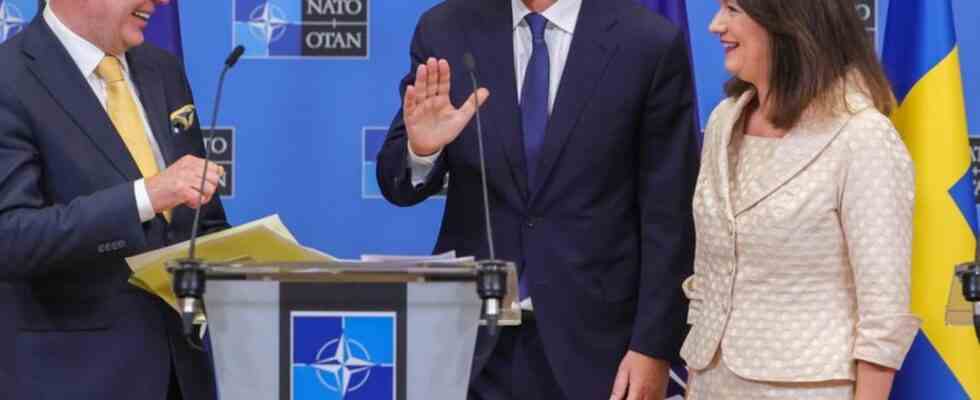military alliance
NATO paves the way for northern expansion with accession protocols
Finnish Foreign Minister Pekka Haavisto (lr), NATO Secretary General Jens Stoltenberg and Swedish Foreign Minister Ann Linde in Brussels. Photo: Olivier Matthys/AP/dpa
© dpa-infocom GmbH
Sweden and Finland are one step closer to joining NATO. Now, among other things, the Bundestag is in demand. And Ankara is being looked at with particular interest.
NATO has taken another decisive step towards admitting Sweden and Finland. The ambassadors of the 30 alliance states signed the so-called accession protocols on Tuesday at the headquarters in Brussels in the presence of the foreign ministers of the two Nordic countries.
These now only have to go through the national ratification processes in order to become effective. After that, Sweden and Finland can officially join the defense alliance, ideally before the end of the year.
“This is a historic day for Finland, for Sweden, for NATO and for Euro-Atlantic security,” said NATO Secretary General Jens Stoltenberg after the signing ceremony.
He is now counting on all Allies to ensure speedy ratification of the accession protocols. Sweden and Finland would make essential and important contributions to the alliance and make NATO even stronger, said Stoltenberg.
However, it is unclear whether it will really happen as quickly as many had hoped. In Germany, according to the FDP parliamentary group, the accession protocols are to be submitted to the Bundestag for approval this Friday. According to parliamentary group leader Amira Mohamed Ali, the left in parliament does not want to go along with it.
What is Turkey doing?
Turkey in particular is regarded as a factor of uncertainty in the necessary ratification. To the annoyance of the other allies, the country had already delayed the start of the accession process for several weeks, citing Sweden and Finland’s alleged support for organizations such as the banned Kurdish Workers’ Party PKK, the Syrian Kurdish militia YPG and the Gülen movement.
Only when both countries pledged in writing on the sidelines of the NATO summit in Madrid last week that they would respond to several of Turkey’s demands did Turkey give up its resistance to the start of the admissions process.
At the same time, however, President Recep Tayyip Erdogan threatened that he would not submit the accession protocols to parliament for ratification if Sweden and Finland did not keep their word. Specifically, he mentioned, for example, an alleged promise by Sweden to extradite more than 70 “terrorists”.
Swedish Foreign Minister Ann Linde, present at the signing ceremony in Brussels, dodged questions afterwards on Tuesday. “Lists and numbers are not mentioned in the agreement,” she said, referring to the Madrid statement. “To my knowledge, we have not received any specific lists.”
Her Finnish colleague Pekka Haavisto added: “Everything that we have agreed on is recorded in the document.” There are no “hidden documents”. In the case of extradition requests, the legal process and court decisions are to be followed.
Sweden and Finland applied for NATO membership on May 18 under the impression of the Russian attack on Ukraine. For decades, the two Nordic countries had prioritized alliance neutrality.
Stoltenberg said on Tuesday that Russia’s brutal invasion of Ukraine had destroyed peace in Europe. That is why it is now important to stand together at this dangerous moment in our history.
Until Finland and Sweden are officially members of the alliance and can therefore request assistance in the event of an attack under Article 5 of the North Atlantic Treaty, they are protected by security guarantees from countries such as the USA, Great Britain, France and Germany. From now on, they can also take part in the meetings of the NATO Council without voting rights.

